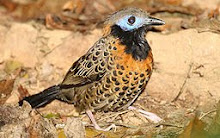The New Forest is not really new. It was established around 1079 by William the Conquerer as a royal hunting park out of 20 separate settlements and farms, hence a "new" forest. William didn't ask the conquered Anglo-Saxons occupants' permission for this. Instead, he imposed Draconian forest laws and his ill-fated son, William Rufus, introduced mutilation for any breach thereof. William Rufus died while hunting in the New Forest in 1100 in what we would call highly suspicious circumstances, but he was so universally hated that there were too many suspects to batten on the downtrodden peasants.
In exchange for losing title to their lands and the right to hunt the deer, however, the New Forest inhabitants gained a few privileges: to graze their stock on the common land, including pigs in the fall to eat the fallen acorns and beechnuts. Some commoners also were allowed to cut wood, although that right went with specific properties. Not everyone who lives in the New Forest owns a house with that ancient right. Yes, these customs still continue. Your property may come with grazing or wood or pannage (i.e. pig-feeding) rights. Of course, you can't increase the footprint or livable space of your house by more than 30 percent, but that's another story.
So, while the origins of the New Forest may be somewhat grim, they don't in any way reflect our experience this weekend, when we were guests of Sue's childhood friend, Sandy, and her husband, Andrew. Yesterday, for example, was a perfect English summer day. We bicycled across the heath, the wind billowing the manes and tails of the grazing ponies, and through the twisted woods of beech and oak. (Too early for pigs!) The enormous trees were so tall overhead in places that they formed a green bower through which we sped. Deer barely bothered to lift their heads as we passed. We ended up at the Royal Oak, a tiny pub in a clearing with picnic tables where we carried our drinks to take advantage of the sun. As lovely as this was, we could see that the snug parlor, barely large enough for three tables, would be even more welcoming on a chilly day when the mist came down and the forest was wreathed in fog and mystery.
Ten miles out and ten miles back again to Sandy and Andrew's warm, brick home and lovely garden full of fuschia, roses and rhododendrum. Andrew barbecued a leg of lamb while robins, nuthatches, great tits and a song sparrow topped up for the evening at their bird feeders or took a late bath in the fountain. Best of all was the talk and laughter, wide-ranging and generous. William Rufus may have come a cropper in the New Forest, but we came away with friends.
Monday, 7 June 2010
Subscribe to:
Post Comments (Atom)


No comments:
Post a Comment